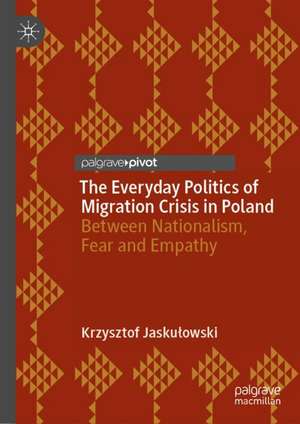The Everyday Politics of Migration Crisis in Poland: Between Nationalism, Fear and Empathy
Autor Krzysztof Jaskulowskien Limba Engleză Hardback – 19 feb 2019
This book explores attitudes towards migrants and refugees from North Africa and the Middle East during the so-called migration crisis in 2015-2016 in Poland. Beginning with an examination of Polish government policy and the discursive construction of refugees in the media, politics and popular culture, it argues that they identified refugees with Muslims, who were deemed to pose a threat to the Polish nation. This analysis establishes the Islamophobic public discourse which is shown to be variously reproduced, negotiated and contested in the nuanced study of Polish attitudes which follows. Drawing on original qualitative research and constructivist theory, the book examines differing stances towards refugees in the context of the lay understanding of the Polish nation and its boundaries. In doing so it demonstrates the influence of discourses that draw on an exclusionary concept of national identity and the potential for them to be mobilised against immigrants. This timely, theory-based case study will provide a valuable resource for students and scholars of Central and Eastern European politics, nationalism, race, migration and refugee studies.
Preț: 417.90 lei
Nou
Puncte Express: 627
Preț estimativ în valută:
79.97€ • 83.70$ • 66.56£
79.97€ • 83.70$ • 66.56£
Carte tipărită la comandă
Livrare economică 01-15 aprilie
Preluare comenzi: 021 569.72.76
Specificații
ISBN-13: 9783030104566
ISBN-10: 3030104567
Pagini: 139
Ilustrații: XI, 139 p. 1 illus.
Dimensiuni: 148 x 210 x 11 mm
Greutate: 0.34 kg
Ediția:1st ed. 2019
Editura: Springer International Publishing
Colecția Palgrave Pivot
Locul publicării:Cham, Switzerland
ISBN-10: 3030104567
Pagini: 139
Ilustrații: XI, 139 p. 1 illus.
Dimensiuni: 148 x 210 x 11 mm
Greutate: 0.34 kg
Ediția:1st ed. 2019
Editura: Springer International Publishing
Colecția Palgrave Pivot
Locul publicării:Cham, Switzerland
Cuprins
Chapter. 1. Introduction: Setting the agenda.- Chapter 2. Preliminaries: nationalism without nations.- Chapter 3. The Politics of the “migration crisis” in Poland.- Chapter 4. Understanding Polishness.- Chapter 5. The Nation under threat.- Chapter 6. Against the currents: refugees welcome.- Chapter 7. Between fear and empathy.- Chapter 8. Conclusions.
Notă biografică
Krzysztof Jaskułowski is Associate Professor at SWPS University of Social Sciences and Humanities, Poland. His research interests include nationalism, migration studies, and the politics of memory.
Textul de pe ultima copertă
This book explores attitudes towards migrants and refugees from North Africa and the Middle East during the so-called migration crisis in 2015-2016 in Poland. Beginning with an examination of Polish government policy and the discursive construction of refugees in the media, politics and popular culture, it argues that they identified refugees with Muslims, who were deemed to pose a threat to the Polish nation. This analysis establishes the Islamophobic public discourse which is shown to be variously reproduced, negotiated and contested in the nuanced study of Polish attitudes which follows. Drawing on original qualitative research and constructivist theory, the book examines differing stances towards refugees in the context of the lay understanding of the Polish nation and its boundaries. In doing so it demonstrates the influence of discourses that draw on an exclusionary concept of national identity and the potential for them to be mobilised against immigrants. This timely, theory-based case study will provide a valuable resource for students and scholars of Central and Eastern European politics, nationalism, race, migration and refugee studies.
Krzysztof Jaskułowski is Associate Professor at SWPS University of Social Sciences and Humanities, Poland. His research interests include nationalism, migration studies, and the politics of memory.
Caracteristici
Offers the first comprehensive study in English of responses to the migration crisis in Poland Highlights revealing tensions within the cultural character of Polish nationalism Contributes to key debates on nationalism, race, Islamophobia, EU migration policy and politics Combines original interviews and a constructivist approach to examine attitudes toward refugees Provides fresh insights into political radicalization and popular nationalism in Europe
